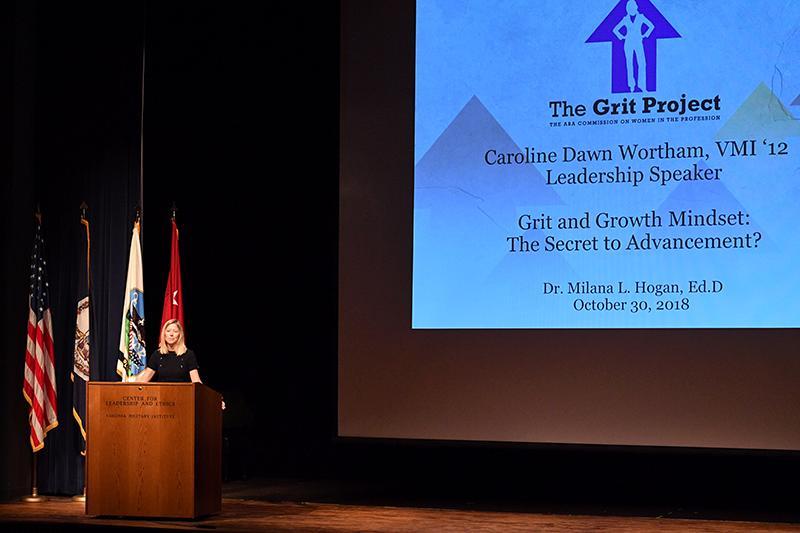Inaugural Wortham Speaker Shares Grit Insight

Milana Hogan addresses Leadership Conference participants today in Marshall Hall’s Gillis Theater.—VMI Photo by H. Lockwood McLaughlin.
LEXINGTON, Va., Oct. 30, 2018—Don’t accept self-limiting beliefs. Practice the things you’re not good at. Then go back and practice them some more. Learn from failure and negative feedback. Most of all, be realistically optimistic—and seek to uplift others, not just yourself.
Those were the key concepts that Milana Hogan, chief legal talent officer at Sullivan & Cromwell LLC, shared with attendees at the VMI Center for Leadership and Ethics’ 2018 Leadership Conference, “Grit and the American Character.” Hogan was the first speaker in VMI’s newly established Caroline Dawn Wortham ’12 lecture series. The series honors the life and legacy of Wortham, a humanitarian activist who died in 2015 at the age of 26 after being hit by a car while riding her bicycle in Hanover County, Virginia.
“She had a total sense of mission in life,” recalled her father, Dr. Edwin Wortham V, who came to post to attend the inaugural lecture. “Nothing stopped that girl.”
Following graduation from Richmond’s all-female St. Catherine’s School in 2008, Wortham sought a new challenge and matriculated at VMI, plunging into all that the Institute had to offer. Not only was she one of the founding members of Keydets Without Borders, traveling to Bolivia with that organization, she also served as the regimental S-2 captain (academics) and was captain of the women’s track and field team. She was a recipient of the Society of the Cincinnati Medal, given by the faculty to a member of the graduating class distinguished for efficiency of service and excellence of character.
After graduating from VMI, Wortham lived and worked in Haiti, where she strove to improve prenatal care for pregnant women. The Carrie Wortham Birth Center in Cabestor, Haiti, opened shortly after her death.
Dr. Edwin Wortham said that he hopes the lecture series will help current cadets to draw inspiration from his daughter’s legacy of service. “If [Carrie] were here, she would say, ‘Dad, it’s not about me. It’s about what we can do to serve the world and make a difference,’” he stated.
Serving the world, though, is an enormous undertaking, and one requiring that strength of character known as grit—which is often thought of as an acronym standing for growth, resilience, integrity, and tenacity. In her remarks, Hogan spoke about some of the research findings contained in her recently published book, Grit: The Secret to Advancement.
Hogan, who holds an undergraduate degree from Brown University and a doctorate in educational leadership from the University of Pennsylvania, defined grit as behavioral perseverance in the face of adversity and the sustained, passionate pursuit of goals.
Seeking to explore the connection between grit and success, Hogan used the example of Roger Federer, the famous Swiss tennis player who’s won 20 Grand Slam titles. Talent alone didn’t get Federer to the top of his game, Hogan noted—he also had a very supportive family and put in the hours and hours of practice necessary to get to the top of his sport. He also failed, over and over again, yet kept going.
“Whatever natural talent you have is only part of the story,” said Hogan. “People of average intelligence and skill can and do become world-class experts and performers.”
Mind, she argued, is just as important as body, if not more so. Hogan stated that a growth mindset free of “ceilings” or self-limiting beliefs such as “I’m just not good at …” is crucial to success, as research has now disproven the idea that intelligence is fixed.
“Having a growth mindset puts you in a position to engage in gritty behavior,” she commented. “The brain is a muscle. The more you work it, the smarter you become.”
Yet there’s good grit and bad grit. Hogan defined good, authentic grit as “the passionate pursuit of hard goals that awes and inspires others to become better people, flourish emotionally, take positive risks, and live their best lives. … Authentically gritty people are the people who inspire us.”
When thinking of good grit, “Carrie [Wortham] came to mind over and over again,” said Hogan. …. Reading about her and what she accomplished after VMI really resonated with me.”
Bad grit, by contrast, involves taking shortcuts, having “summit fever” and refusing to bow to common sense in the pursuit of goals, and focusing narcissistically on the self.
Building good grit, said Hogan, can be accomplished by getting comfortable with uncertainty, learning how to handle failure and rewarding oneself and others for effort, not outcomes.
“Most of the time when you’re getting really good at something, there’s also failure along the way,” Hogan commented. “Grit is about playing the long-term game.”
The Leadership Conference concluded Tuesday afternoon with small-group “grit café” exercises and a speech by Afghanistan war veteran and author James Hatch.
-Mary Price
-VMI-
.svg)
.png)